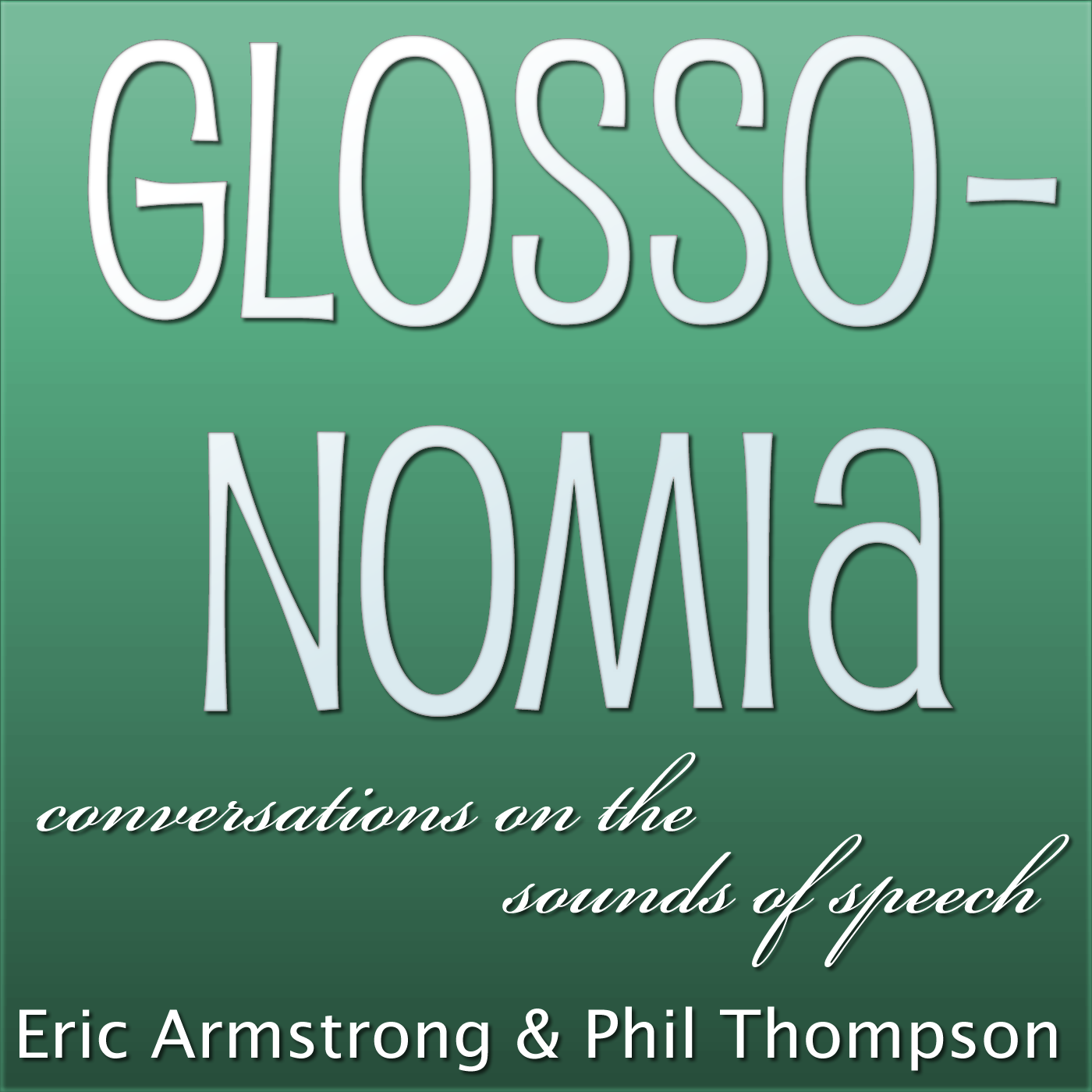Episode 4: t & d

b' We\\u2019re digging into /t/ and /d/ on Glossonomia this week. Hosts Phil Thompson and Eric Armstrong discuss how we make this cognate pair of consonants, voiceless and voiced alveolar stop/plosives.
We\\u2019re digging into /t/ and /d/ on Glossonomia this week. Hosts Phil Thompson and Eric Armstrong discuss how we make this cognate pair of consonants, voiceless and voiced alveolar stop/plosives.
Today\\u2019s Topics include:
\\t\\u2022\\tthe concept of Lenition (softening), in particular, the terms Fortis vs. Lenis.
\\t\\u2022\\tVoice Onset Time (VOT): when does the voicing begin? Normally, /t/ in English is aspirated at the beginning of stressed syllables. In English, initial /d/ in stressed syllables is, essentially voiceless but unaspirated, whereas intervocalic (between two vowels).
\\t\\u2022\\tIn Phonecian, the word for the letter D was, in fact \\u201cdoor\\u201d\\u2014daleth.
\\t\\u2022\\tT comes from Greek Tau, and Semitic Tav, which resembled a simple cross.
\\t\\u2022\\tSpellings: t (Ted, atop, get), th (Thames, Thomas, thyme), pt- (ptarmigan, pterodactyl, pterigoid)
\\t\\u2022\\tWikipedia has a paragraph on the origins of the name Thames, and its Greek influenced Th- spelling
\\t\\u2022\\tIPA [th] for aspiration, [t=] for unaspirated; [d]
\\t\\u2022\\tThere is no perfect phonetic way to notate things; there are many ways to heaven in the phonetic realm
\\t\\u2022\\tApart from English, there are many languages where /t/ is not aspirated
\\t\\u2022\\t\\u201cCool\\u201d words of the week\\u2014prevocalic: before a vowel; postvocalic: after a vowel; intervocalic: between 2 vowels.
\\t\\u2022\\tNo audible release of final /t/ \\u201cbut, not, that\\u201d IPA [ b\\u028ct \\u031a n\\u0252t \\u031a \\xf0\\xe6t \\u031a ]
\\t\\u2022\\tdevoicing of consonant clusters tr-, -tl, tw-,
\\t\\u2022\\tpreceding /s/, as in steam, \\u201cdeaspirates\\u201d the /t/, and may reduce the devoicing in stream.
\\t\\u2022\\tpast-participles: -ed endings following a voiceless consonant are /t/ e.g. hoped is pronounced [ ho\\u028apt ], following a voiced consonant or vowel are pronounced /d/
\\t\\u2022\\tOrthoepy: the \\u201ccorrect\\u201d pronunciation of a language, or a tradition of pronouncing words as they are spelled; e.g. often with a /t/ or not
\\t\\u2022\\tIntervocalic /t/: In North America typically a voiced tap [\\u027e] or [ t\\u032c ]
\\t\\u2022\\tSound Patterns of Spoken English by Lynda Shockey
\\t\\u2022\\tGlottaling, using the glottal stop, as it \\u201cHit me, baby, one more time\\u201d
\\t\\u2022\\tAssimilation, where the sound is moved to the place of the following consonant
\\t\\u2022\\tGlottal reinforcement: /t/ supported by closure in the glottis
\\t\\u2022\\tEjectives: non-pulmonic is \\u201cnot from the lungs\\u201d IPA [ t\\u2019 ]: the glottis is closed and the larynx rises to pressurize the [ t\\u2019 ] behind the closure at the gum ridge
\\t\\u2022\\tgeminate or twinned consonants, e.g. hit Ted, either the first is unreleased, or we may use \\u201cdouble tapping\\u201d (to release both /t/ sounds)
\\t\\u2022\\tRaymond Hickey Irish English Resource Centre slit /t/ and in Newfoundland, Australia, New Zealand; Kath & Kim\\u2019s grayshsh; JIPA: The acoustic character of fricated /t/ in Australian English: A comparison with /s/ and /\\u0283/ by Mark J. Jones and Kirsty McDougall
\\t\\u2022\\tPalatal versions of /t/ and /d/ (IPA [c] and [\\u025f] )
\\t\\u2022\\tBack of tongue sloppiness vs. Front of tongue agility; greater phonetic variation with tongue tip
\\t\\u2022\\t/t/ epenthesis, e.g. Prince vs. prints; tense vs. tents; sense vs. cents
\\t\\u2022\\tPrescriptions: watch out for [ts] in initial settings \\u201csplashy /t/\\u201d; skills to be able to do unaspirated /t/ or to have an early voice onset on /d/ (I\\u2019d probaby notate that as [d\\u032c]
\\u201cSome of the things we\\u2019re talking about are questions of precision. \\u2018Inappropriate Precision\\u2019 is what robots do. What dancers do is \\u2018appropriate precision,\\u2019 we hope. And so, dancers of the mouth ought to be equivalently curious about, and in love with, the possibility of precision but only as it achieves the gracefulness, or expressiveness, or wildness that\\u2019s required of the artistic endeavour in front of them.\\u201d
Next week we\\u2019re on to the vowel sound happY.
Email us at glossonomia@gmail.com!
Write a review about our show at the comments on iTunes here.
'